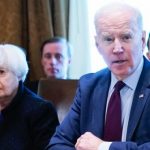We’ve been covering the spectacular failure of Silicon Valley Bank since news broke on Friday that the bank had been shut down and taken over by federal regulators.
As Bob Hoge reported, the bank’s failure can be laid in some measure at the feet of its focus on wokeness and green energy.
Although you can’t tie all of SVB’s woes to clean energy—many experts are pointing to its untimely reliance on bonds—one can’t help but notice a pattern here. Massive investments, either financed directly by the government or made possible by fed policy, are routinely poured into the sector, only to be lost in spectacular fashion.
Speculation as to whether a bail-out was in the offing has been rampant all weekend. On Sunday morning, Treasury Secretary Janet Yellen spoke with Face the Nation’s Margaret Brennan regarding the situation and, regarding a bail-out, stated “We’re not going to do that again.”
Brennan tweeted:
I asked Treasury Secretary Yellen if she had ruled out government intervention in regard to Silicon Valley Bank. She said that “we’re not going to do that [bank bailout] again” but the US is “concerned about depositors” & focused on their needs.
Followed by:
“We certainly are working to address the situation in a timely way,” Secretary Yellen says in regard to my question about whether the US expects a deal or something to reassure the markets before trading resumes in Asia tonight.
In the below segment, Yellen acknowledges the concerns that have been raised, and maintains that they are working to “design appropriate policies to address this situation,” but declines to provide further details.
MARGARET BRENNAN: I want to get straight to it because the markets will soon reopen for trading. Does the government need to intervene and take emergency measures because of SVB’s failure?
TREASURY SECRETARY JANET YELLEN: Well, let me say America’s economy relies on a safe and sound banking system that can provide for the credit needs of our households and businesses. So whenever a bank, especially one, like Silicon Valley Bank with billions of dollars in deposits fails, it’s clearly a concern. From the standpoint of depositors, many of which may be small businesses, they rely on access to their funds, to be able to pay the bills that they have, and they employ tens of thousands of people across the country. We’ve been hearing from those depositors and other concerned people this weekend. So let me say that I’ve been working all weekend with our banking regulators to design appropriate policies to address this situation. I can’t really provide further details at this time. But what I do want to do is emphasize that the American banking system is really safe and well-capitalized, it’s resilient. In the aftermath of the 2008 financial crisis. New controls were put in place better capital and liquidity supervision, and was tested during the early days of the pandemic, and proved its resilience so Americans can have confidence in the safety and soundness of our banking system.
A full transcript of the interview can be found here.

